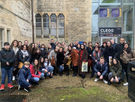ERASMUS +
Since the academic year 2016-17, Vilafant Institute has been part of biennial projects within the Erasmus Plus Program of the European Union (established in 1987). Following the reform in 2014, Erasmus+ has a new format, which combines all current EU plans in the field of education, training, youth, and sport. It focuses on formal and informal learning beyond the borders of the EU with a clear commitment to internationalization, opening up to third countries with the aim of improving the educational and training capacities of individuals (students, teaching staff, and other education professionals).
What is the objective?
The objective of our projects within this framework is primarily aimed at improving the methodology used in classrooms, working on projects and basing learning on real problems. At the same time, it focuses on the cross-curricular work of subjects and openness to new ways of learning. We have initiated this process of innovation in our teaching and learning methods, applying this transformation to Social Studies, Mathematics, and English (the language used to share our experiences with the other participating centers of very diverse origins).
What is our methodology?
Over these years, after various classroom reflections on topics such as innovation, entrepreneurship, etc., framed within emotionally effective work, students have collected information, carried out tasks observing their immediate environment, and have ended up carrying out projects collaboratively to improve something in the local context and leave their mark. Therefore, a key issue is to establish direct contact with local entities, both institutions and associative bodies, and other groups from diverse fields working for the community.
The working process is proving to be very enriching for both teachers and students, who are open and motivated by the possibility of applying their knowledge and skills to raise and solve issues that affect them very closely.
What is our trajectory?
To contextualize our project within the Erasmus+ Program, throughout its development, students and teachers have shared their experiences on several occasions with the participating members from other countries. Some of them have traveled to other educational centers to present the evolution of their work and firsthand experience the educational models of each country, their processes of applying different methodologies, the transformation of these methodologies, and the results they obtain. The groups of traveling students have been responsible for conveying what is being done in our classrooms and transferring to the rest of the students everything they have learned and shared during the days of the meetings.
































